My second year at Microsoft
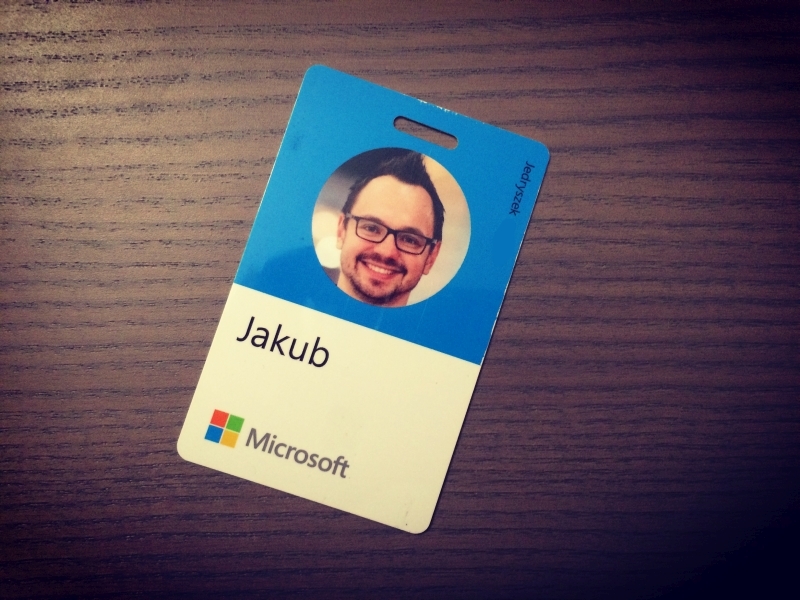
It feels like it was yesterday when I published My first year at Microsoft. Time is going fast! This is what usually happens when you have a lot of things to do, and you enjoy it. My second year spent at Microsoft has been great! Full of new experiences, challenges, and lessons learned.
Azure Portal
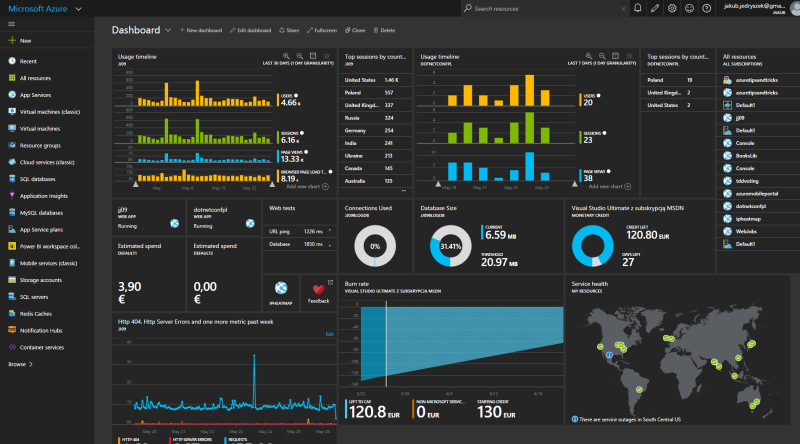
For the past 2 years I've been working on the Azure Portal. The last 12 months have been very important for the entire Portal team. Since December 2, 2015, the new Azure Portal is no longer in preview and is now an official management interface for Azure. The Old Portal is still available, but we slowly retire its features, and move them one by one to the new Portal. More, and more people start liking the new, revolutionary UI. We are getting requests to Open Source our UI so that people can use it to build their own management interfaces. If you are interested in that, vote here.
Over the last year I helped to improve Portal reliability, which was our last milestone before becoming the official management portal for Azure. It was one of the hardest things I've ever worked on, because of the Portal Architecture. We started with 80% reliability in some areas, and our goal was to achieve 99.9%. It was an extensive few months of investigation, bug fixing, and optimization. Once we achieved three nines, now we have to stay there. We are getting regressions from time to time, but most of the time we keep the reliability at the desired level.
Another big area was improving accessibility (keyboard + screen reader support). It was a very challenging task because, again, the Azure Portal is nothing like most web apps. Especially from the design perspective. It's different, non-standard, and has a bunch of features nobody has done before (blades, tiles and journeys). As of today, I am amazed at how much progress has been done, and what the current state of Portal accessibility is. One thing that amazes me at Microsoft is how the smallest, tiniest, everyday improvements make a difference in the long run.
Besides reliability and accessibility, I work mostly, on the web controls that are being exposed by our Framework. Partner teams (e.g., Web Apps, Virtual Machines, SQL, etc.) are building Azure features using our Framework and controls. Over the last 12 months I created a few controls, added a lot of features to existing ones, fixed a ton of bugs, and made a lot of improvements for date/time controls with help from Matt Johnson (yes, he does not work for our team, but he is one of the best date/time and timezone experts in the World, and it happened that he works for Microsoft so it would be stupid to not ask for his expert advice).
There is also one thing I need to rant about Safari 9.x (and all earlier versions) does not support Internationalization API (Intl). We are using Intl API for numbers and currency formatting. At the beginning, when we were still in preview, we hoped that Safari will add Intl support soon (in a year or so), but it didn't happen. We had to use polyfill. Oh...actually I should rant about other issues we had with Safari (like local storage does not work in private mode), but you can check caniuse.com or just read an article: Safari is the new IE.
In addition to working on features, I also did a few improvements to our development workflow. From automation scripts, through some helper methods for unit testing, to speeding up local build time by changing MSBuild verbosity (printing to console takes time, in some cases we saved up to 1 minute of build time thanks to this simple trick!).
Speaking, traveling, conferences
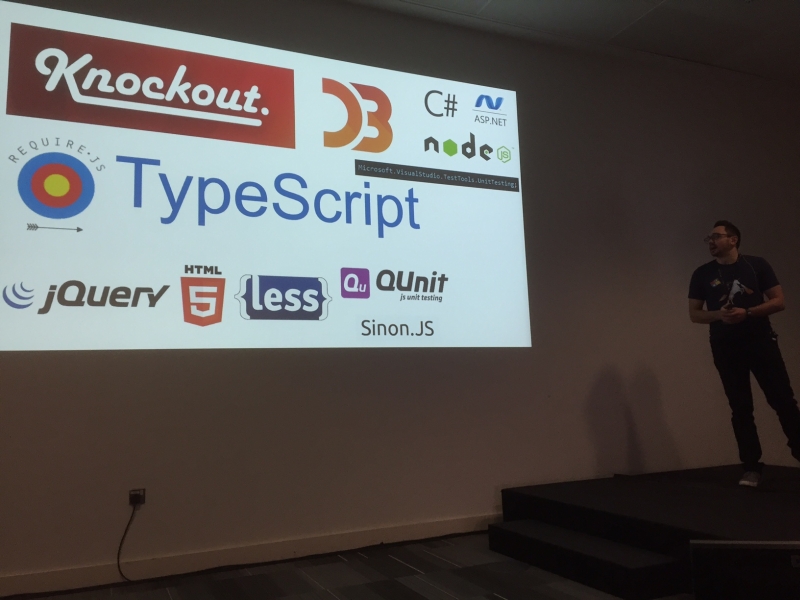
Over the last year I have spoken at a few conferences, Seattle Code Camp, and gave a talk at SeattleJS meetup.
I've been speaking mostly about TypeScript, Azure Portal and Aurelia Framework (yes - the last one is totally not related to my day job).
My most recent talk about the Azure Portal architecture received a lot of great feedback. One gentleman told me that it was the best talk of the VSLive Redmond conference, somebody wrote a comment that it was the "Most interesting non-Scott Hanselman presentation ever", and one person mentioned it (as "excellent talk") in Azure Portal user voice (which I found while writing this post and searching for a link to Open Source Portal UI user request for previous section).
Over the last year I learned that going to talks at conferences is the least important thing. The most important is to connect with people from outside of your everyday work environment, share experiences, and network. The most interesting conversations don't happen during the presentations but at the post-conference dinner or after-party. I strongly recommend reading chapter 14 of Never Eat Alone before attending a conference!
When I am telling people that I travel around the World to speak at conferences, they think it looks like this:

They forgot that most of the time it looks like that:
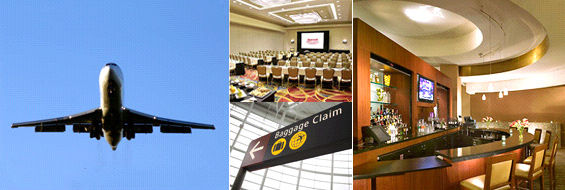
Of course there are pros and cons.
Pros:
- Learning new things (while preparing your talk, and during the conference from others).
- Meeting new people
- Visiting places you haven't been before. On my way to NDC London, I paid from my own pocket for a flight through Iceland with 34 hours connection flight in Reykjavik. I managed to see the Golden Circle, attend New Year's Concert at Harpa, and I've seen the Northern Lights. I have also seen a little bit of London during the same trip
Cons:
- You need to work after hours to learn and prepare a talk for the conference. You also need to write a good abstract so your talk will be selected. This takes a lot of time!
- Travelling to a conference takes time that you could spend with friends, family, or riding a bike. Even if it is a domestic flight it takes ~30 mins to get to the airport, then ~2 hours at the airport, ~2-4h during the flight, ~30 mins to get to the hotel etc. When it is on the other continent then you waste even more time + get jet lag. Oh...and you need to pack the day before (~30 mins to 1 hour), and you don't have your nice 3-monitor setup and comfortable Herman Miller chair for a few days.
- Sometimes you don't see anything except the airport, aircraft, hotel and the conference venue (that was the case when I went to ConnectJS conference in Atlanta and Open Source North in Minneapolis).
Thanks to speaking at conferences, I met a lot of interesting people and definitely expanded my knowledge. What's important: I learned the most during one on one conversations in the hallway or at the conferences' dinners.
In addition to conferences I was a guest at .NET Rocks podcast, where I talked about the Azure Portal. I was also interviewed by David Giard - who I met at Open Source North conference - for his Technology and Friends series. Sara Clayton - who works on Open Source at Microsoft, and who I met at the All Things Open conference - did an interview with me about my Open Source library: voiceCmdr. Jeremy Foster (who I met at SeattleJS meetup) did an interview with me for his CodeChat show (episode coming soon).
Learning

Over the last year I've learned a lot about web development, performance, and accessibility. A lot of things I learned are captured in my last talk about the Azure Portal. I improved my coding skills, debugging skills, and also - thanks to attending conferences - communication skills, which is very important in my Software Engineer portfolio.
In my first-year review I forgot to mention Microsoft Library, which is one of my favorite benefits at Microsoft. Most books I have read over last 2 years are from MS Library. I reviewed a few of them, and some landed in my favorite books list. The Pragmatic Programmer book said that you should read a technical book every quarter.
Last time, I also didn't mention that when you are working on something related to Cloud, you have to be on-call once for a while. I am very lucky, because our team is large, and rotation requires everybody to be on-call only 1 week per 6-7 months. I have some friends who are on-call once every three weeks, or even every other week (sic!). FYI - being on call means:
- no flexible work schedule
- no freedom (you need to be able to act on incident right away = you need to be close to your computer and Internet = you don't go hiking, you don't go out with friends, you don't go for a bike ride)
- I don't know what can be worse than your phone ringing at 4 am, and some people asking you for help with investigating some problem they cannot solve (hint: these people are not stupid, the problem is hard, your brain usually do not work the best in the middle of the night)
However, there are also good things about being on-call:
- you can learn more about the project (when you need to investigate/diagnose something in the area you are not familiar with)
- you can improve your debugging/investigating/diagnosing skills
- you can meet new people across the company
The new thing for me, over the last 12 months, was conducting interviews. It was a very interesting experience. The most important thing I've learned was to never skip the coding question. My interview usually contains 3 parts:
- chat about candidate previous projects/experience
- easy coding question
- design question
There will be more details in an upcoming blog post, but if you are interviewing people, I recommend you to check out The Guerrilla Guide to Interviewing (version 3.0) by Joel Spolsky.
Staying fit and healthy

When you are a developer, you need to take care of your health! Sitting 10+ hours is not good for you. Sitting is the new smoking. Additionally, it turns out that staying fit and healthy makes you better developer.
I bike, I swim, I run, I hike, I take part in bike rides (like 206 miles Seattle to Portland, or 180 miles Seattle to Vancouver), and I compete in triathlons once for a while.
Staying fit and healthy is not only about exercising. It is actually more about your diet:
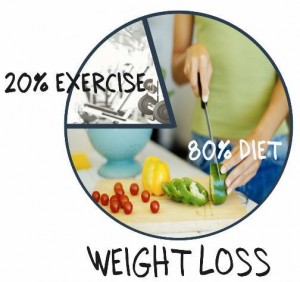
However, diet-miracle is not a way to go. Last year I tried to count calories I burn and consume throughout the day, and develop a diet I would be able to sustain for a long term. The trick is to realize that it is not worth eating some things. E.g., this 500 calories cookie is not worth it. I would rather eat two Symphony bars from Hershey's. Oh...and you need to wait for results for a couple of months or so.
It's great that Microsoft cafeterias now provide calorie counts in the food menu. I am not eating these burgers that are 1400 calories, but other ones that have only 700. Together with running trails on the Microsoft campus, it provides a great fitness bundle.
Oh...and I forgot to mention another awesome Microsoft benefit: Pro Club gym - one of the best gyms on the West Coast, and for sure the best in the Seattle area. When I did a tour (right after I joined Microsoft 2 years ago), and the guy who was showing me around told me that they can service my car when I work out I was sure he was joking...he wasn't.
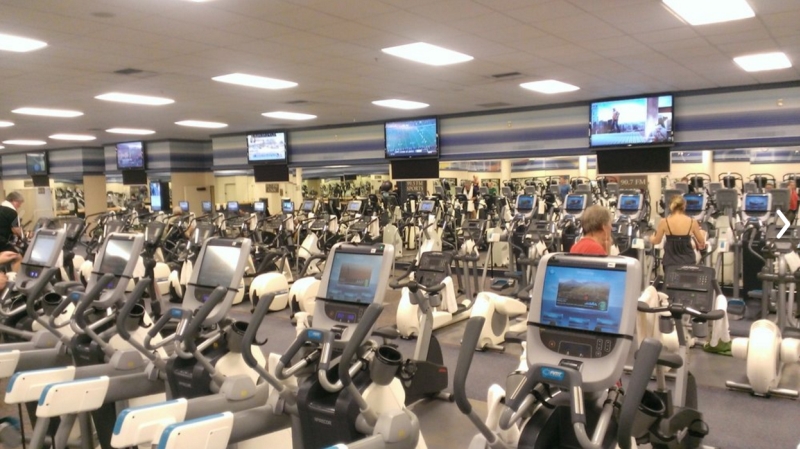
What next?
Stay tuned!